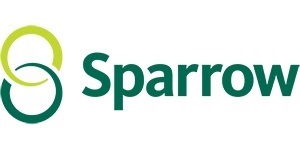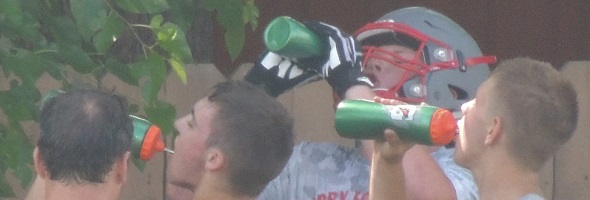
MHSAA Teams with Sparrow Health
February 16, 2015
By Geoff Kimmerly
Second Half editor
Providing information and best practices to players, parents, coaches and administrators on how best to minimize health risks is a key component of keeping student-athletes safe. The Michigan High School Athletic Association has teamed with Sparrow Health System of Lansing to better inform its member schools on such health and safety matters.

Sparrow, a member of the prestigious Mayo Clinic Care Network, is mid-Michigan’s premier healthcare organization with more than 10,000 caregivers. Sparrow’s Sports Medicine division offers programs for athletes at all levels and includes primary care physicians, orthopedic surgeons, physical therapists and athletic and performance trainers.
Sparrow will lend its expertise through the MHSAA Website and on-site at various MHSAA tournament events. Resources from Sparrow staff, including information on current health and safety topics and trends, will be accessible online through the Health & Safety page of the MHSAA Website.
Sparrow’s contributions also will be promoted through the MHSAA’s multiple social media platforms. “This partnership is one of the biggest steps we’ve ever taken to build the MHSAA’s capacity to address the almost daily questions we receive about student-athlete health and wellness, and to sort out and solve the biggest issues of school sports safety,” said John E. “Jack” Roberts, executive director of the MHSAA.
A key component to Sparrow’s addition to the MHSAA Website is an “Ask the Experts” feature that connects users directly to Sparrow’s Sports Medicine staff. Sparrow also will set up booths at various MHSAA tournaments where staff will be available to answer similar questions and discuss sports medicine-related issues.
“Sparrow is thrilled to partner with the MHSAA,” said Stella Cash, Sparrow vice president for development and strategic partnerships. “We have the region’s pre-eminent primary care physicians trained in sports medicine who specialize in the prevention and treatment of sports-related injuries.
Parents and coaches can turn to us for all health-related issues and trust we are focused on transforming care to keep their high school athletes fit, healthy and in the game.”
Sparrow Health System includes hospitals in Lansing, St. Johns, Ionia and Carson City as well as Physicians Health Plan, Sparrow Physicians Health Network, the Sparrow Medical Group and the Michigan Athletic Club. Sparrow also is affiliated with Michigan State University’s three human health colleges.
The MHSAA is a private, not-for-profit corporation of voluntary membership by more than 1,400 public and private senior high schools and junior high/middle schools which exists to develop common rules for athletic eligibility and competition. No government funds or tax dollars support the MHSAA, which was the first such association nationally to not accept membership dues or tournament entry fees from schools. Member schools which enforce these rules are permitted to participate in MHSAA tournaments, which attract more than 1.4 million spectators each year.

Athletes: Get Ready to Beat the Heat
August 2, 2019
By Geoff Kimmerly
Second Half editor
While this summer may have seemed to arrive late in many parts of Michigan, the warm and sunny weather over these last few weeks has provided another reminder that student-athletes must prepare for training in hot weather that traditionally accompanies the beginning of August as MHSAA member schools prepare to begin fall sports practices this month.
Each year, the MHSAA provides information to its member schools to help them prepare for hot weather practice and game conditions during the late summer and early fall. Practices for cross country, football, Lower Peninsula girls golf, boys soccer and Lower Peninsula boys and Upper Peninsula girls tennis can begin August 12, with volleyball and Lower Peninsula girls swimming & diving able to start August. 14.
The “Health & Safety” page of the MHSAA Website has a number of links to various publications and information including guidelines for acclimatization from the National Athletic Trainers’ Association and recommendations on proper hydration from the National Federation of State High School Associations (NFHS). The preseason publication Heat Ways also is available for download and includes valuable information on heat management in addition to requirements and resources regarding head injuries and sudden cardiac arrest.
The first days of formal practices in hot weather should be more for heat acclimatization than the conditioning of athletes, and practices in such conditions need planning to become longer and more strenuous over a gradual progression of time. Schools also must consider moving practices to different locations or different times of day, or change practice plans to include different activities depending on the conditions. Furthermore, football practice rules allow for only helmets to be worn during the first two days, only shoulder pads to be added on the third and fourth days, and full pads to not be worn until the fifth day of team practice.
The MHSAA advises student-athletes to make sure to hydrate all day long – beginning before practice, continuing during and also after practice is done. Water and properly-formulated sports drinks are the best choices for hydration, while energy drinks, high-carbohydrate fruit juices (greater than eight percent carb content), carbonated and caffeinated beverages are among those that should be avoided.
A number of member schools follow the MHSAA’s Model Policy for Managing Heat & Humidity, which while not mandated for member schools was adopted as a rule for MHSAA postseason competition in 2013. The plan directs schools to begin monitoring the heat index at the activity site once the air temperature reaches 80 degrees, and provides recommendations when the heat index reaches certain points, including ceasing activities when it rises above 104 degrees. (When the temperature is below 80 degrees, there is no combination of heat and humidity that will result in a need to curtail activity.) The model heat & humidity policy is outlined in a number of places on the MHSAA Website, including as part of Heat Ways.

